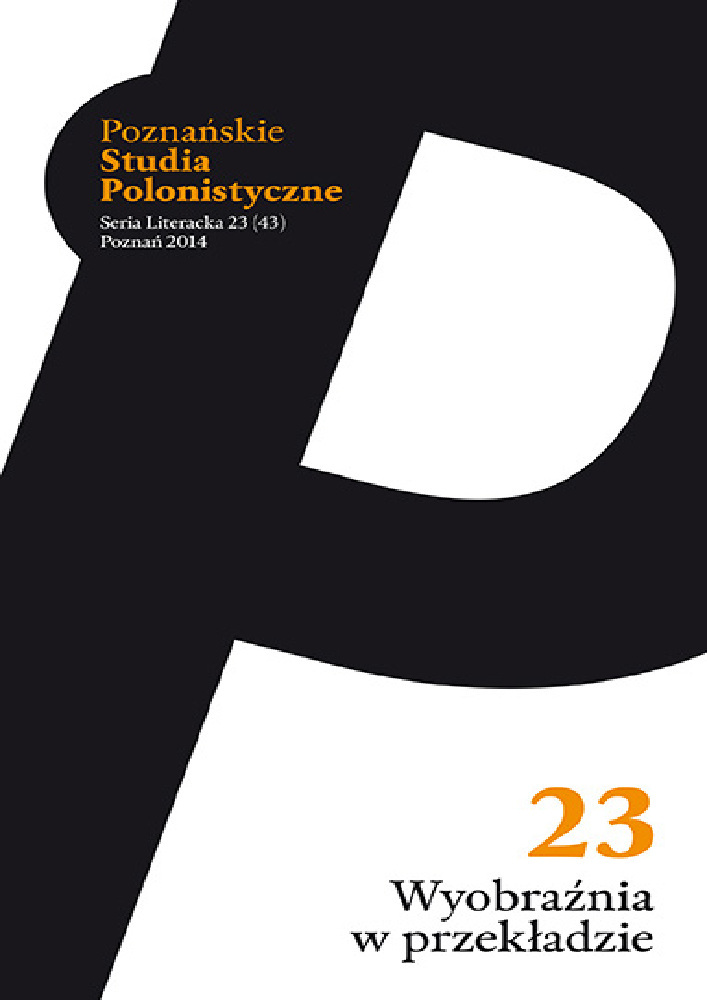Abstract
In a literary work, signals that trigger reader’s inferential excursions allow the reader’s imagination to identify with and control the represented world. They constitute an important element of sense-generating mechanism. Thanks to imagination, the translator imitates the inferential mechanism of the original on various level’s of the text’s structure, activating the imagination of the reader. The translator’s imagination is bi- or multivalent in having the linguistic-semiotic, literary, and cultural quality. Although it manifests itself in language, it goes beyond the boundaries of language. Imagination is a form of consciousness which has no object of its own, and a medium connecting a specific non-imaginary knowledge with representations. It constitutes a mind faculty shaped on the basis of sensory and mental perception. It is derived from individual principles of perception and cognition data processing. It usually requires a stymulus to activate the capabilities of the imagining subject. As a mind faculty, imagination is based on the mental capability common to all people, which is the ability to create chains of associations.
Translator’s respect for inferential excursions in the original text is necessary for retaining the original meaning, regardless of whether they occur on the phonetic-phonological level (as in Ionesco’s The Chairs), or on the level of image-semantic and syntactic relations (as in translation of Apollinaire’s Zone), or on the level of syntax (as in translation of Mrożek’s short stories into Slovenian), or on the level of cultural communication (as in Slovenian translation of Gombrowicz’s Trans-Atlantic).
References
Apollinaire G., Strefa, tłum. A. Ważyk, „Almanach Nowej Sztuki” 1925, z. 18.
Apollinaire G., Zone, w: idem, Alcools, Paris 1985.
Bachelard G., Wyobraźnia i materia, tłum. A. Tatarkiewicz, w: idem, Wyobraźnia poetycka, tłum. H. Chudak, A. Tatarkiewicz, wybór. H. Chudak, przedmowa J. Błoński, Warszawa 1975.
Balcerzan E., Perehenia i słoneczniki, wstęp. S. Sterna-Wachowiak, Poznań 2003.
Balcerzan E., Słowo wstępne (Przekład całkowity, czyli o potędze hiperboli), w: Ricoeur P., Torop P., O tłumaczeniu, tłum. T. Swoboda, S. Ulaszek, wstęp E. Balcerzan, Gdańsk 2008.
Barańczak S., Pomieszanie języków, w: idem: Tablica z Macondo, Londyn 1990.
Derrida J., O gramatologii, tłum. B. Banasiak, Warszawa 1999.
Dobrzyńska T., Tekst. Próba syntezy, Warszawa 1993.
Duszak A., Tekst, dyskurs, komunikacja międzykulturowa, Warszawa 1998.
Eco U., Lector in fabula, tłum. P. Salwa, Warszawa 1994.
Greimas A.J., Du sens, Paris 1970.
Hoffman E., Zagubione w przekładzie, tłum. M. Roniker, Londyn 1995.
Ionesco E., Krzesła, w: idem, Teatr, tłum. J. Kosiński, t. 1, Warszawa 1967.
Ionesco E., Les chaises. Farce tragique. Suivi de L’impromptu de l’Alma, Paris 1984.
Jeleński K.A., Szkice, wybór W. Karpiński, Kraków 1990.
Kosslyn S.P., Pomerantz J.R., Imagery, propositions and the form of internal representations, „Cognitive Psychology” 1977, nr 9.
Kuhn T.S., Struktura rewolucji naukowych, tłum. H. O stromęcka, posłowie tłum. J. Nowotniak, Warszawa 2001.
Legeżyńska A., Tłumacz i jego kompetencje autorskie, Warszawa 1999.
Lewicki R., Obcość w odbiorze przekładu, Lublin 2000.
Mayenowa M.R., Poetyka teoretyczna w Polsce. Zagadnienia języka, Wrocław 1974.
Mrożek S., Cierpienia młodego Werthera, w: idem, Dzieła zebrane, t. 2: Opowiadania i donosy 1980–1989, Warszawa 1995.
Mrożek S., Trpljenje mladega Wertherja, tłum. N. Jež, „Ljubljanski dnevnik” 1989, nr 343.
Mrożek S., Wina i kara, w: idem, Opowiadania, Kraków 1974.
Mrożek S., Zločin in kazen, w: idem, Leteči slon, tłum. B. Sömen, Ljubljana 1980.
Pylyshyn Z.W., Spór o wyobraźnię: medium analogowe czy wiedza ukryta, tłum. J. Suchecki, w: Psychologia poznawcza w trzech ostatnich dekadach XX wieku, red. Z. Chlewiński, Gdańsk 2007.
Ricoeur P., Radość i udręki tłumaczenia, w: Ricoeur P., Torop P., O tłumaczeniu, tłum. T. Swoboda, S. Ulaszek, wstęp E. Balcerzan, Gdańsk 2008.
Roux D. de, Rozmowy z Gombrowiczem, Paryż 1969.
Sarmata kontestujący, „Ruch Literacki” 1975, z. 4.
Sartre J.P., Wyobrażenie, tłum. P. Beylin, Warszawa 1970.
Wierzbicka A., Język – umysł –kultura. Wybór prac, red. J. Bartmiński, Warszawa 1999.
License
Authors
Authors of texts accepted for publication in „Poznańskie Studia Polonistyczne. Seria Literacka” are required to complete, sign and return to the editor's office the Agreement for granting a royalty-free license to works with a commitment to grant a CC sub-license.
Under the agreement, the authors of texts published in „Poznańskie Studia Polonistyczne. Seria Literacka” grant the Adam Mickiewicz University in Poznań a non-exclusive, royalty-free license and authorize the use of Attribution-NoDerivatives 4.0 International (CC BY-ND 4.0)Creative Commons sub-license.
The authors retain the right to continue the free disposal of the work.
Users
Interested Internet users are entitled to use works published in „Poznańskie Studia Polonistyczne. Seria Literacka” since 2016, for non-commercial purposes only, under the following conditions:
- attribution - obligation to provide, together with the distributed work, information about the authorship, title, source (link to the original work, DOI) and the license itself.
- no derivatives - the work must be preserved in its original form, without the author's consent it is not possible to distribute the modified work, such as translations, publications, etc.
Copyrights are reserved for all texts published before 2016.
Miscellaneous
Adam Mickiewicz University in Poznań retains the right to magazines as a whole (layout, graphic form, title, cover design, logo etc.).
